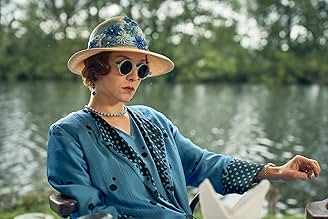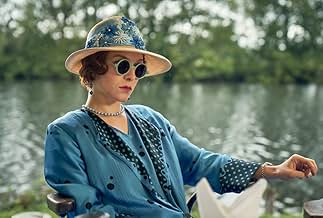IMDb-BEWERTUNG
6,1/10
5658
IHRE BEWERTUNG
Ein Dienstmädchen, das im England der Nachkriegszeit lebt, plant heimlich ein Treffen mit dem Mann, den sie liebt, bevor er abreist, um eine andere Frau zu heiraten.Ein Dienstmädchen, das im England der Nachkriegszeit lebt, plant heimlich ein Treffen mit dem Mann, den sie liebt, bevor er abreist, um eine andere Frau zu heiraten.Ein Dienstmädchen, das im England der Nachkriegszeit lebt, plant heimlich ein Treffen mit dem Mann, den sie liebt, bevor er abreist, um eine andere Frau zu heiraten.
- Auszeichnungen
- 2 Nominierungen insgesamt
Nathan Chester Reeve
- Dick
- (as Nathan Reeve)
Sope Dirisu
- Donald
- (as Sope Dìrísù)
Empfohlene Bewertungen
Greetings again from the darkness. Every writer has a story about what inspired them to put words on the page. What we have here is Eva Husson directing a script from Alice Birch (LADY MACBETH, 2016) who has adapted the 2016 novella from British author Graham Swift. We follow Jane Fairchild through three stages, as her work as a maidservant allows her to become "an occupational observer of life."
It's Mothers' Day 1924 and Jane (Odessa Young, SHIRLEY, 2020) is anticipating her latest romantic tryst with Paul Sheringham (Josh O'Connor, EMMA., 2020). Both know this is their final time together, and they take full advantage. Jane's employers, Godfrey and Clarrie Niven, are meeting Paul's parents for a celebratory luncheon with Emma (Emma D'Arcy), the 'proper' woman Paul is to marry. Oscar winner Colin Firth (THE KING'S SPEECH, 2010) and Oscar winner Oliva Colman (THE FAVOURITE, 2018) play the Nivens, and deaths from WWI hang over all of these families like the darkest of clouds.
The story is told in non-linear fashion, with Jane and Paul's final lovemaking session being that which all other events seem to revolve. We also spend some time with Jane in her 40's as she is living with her philosopher husband Donald (Sope Dirisu), and then in her 80's as she is celebrated as a renowned and prize-winning author. In this last stage, Jane is surprisingly played by the great Glenda Jackson, a two-time Oscar winner (A TOUCH OF CLASS, 1973, and WOMEN IN LOVE, 1969), who has only appeared in a handful of TV movies these past thirty years. Ms. Jackson turns 86 next month, and spent time as an elected member of Parliament. She's always been an interesting person, and it's terrific to see her back on the big screen - even if she only gets a couple of brief scenes followed by one substantial one near the end.
It's a beautiful film and it's sensuously photographed, though maybe a bit odd in that it focuses so diligently on the visuals (thanks to cinematographer Jamey D Ramsay), while actually following a woman's journey into writing. Love (or lack of it) and grief and life's transitions are all on display, as are the harsh realities of class differences. Ms. Young and Mr. O'Connor are both terrific, and though she has minimal screen time, we are stunned again at just how much emotion Ms. Colman can convey with her face.
Memories and recollections of "that day" play a crucial role as the mature Jane wrestles with writing her novel ... one that her publisher expects to be a thriller. Of course, we watch as Jane's story plays out, so we know where her writing is headed. The film has a vagueness to its storytelling that prevents us from ever fully engaging with Jane or any of the rich, sad people, yet it's such a beautiful film to look at that we never seem to mind.
In theaters on April 8, 2022.
The story is told in non-linear fashion, with Jane and Paul's final lovemaking session being that which all other events seem to revolve. We also spend some time with Jane in her 40's as she is living with her philosopher husband Donald (Sope Dirisu), and then in her 80's as she is celebrated as a renowned and prize-winning author. In this last stage, Jane is surprisingly played by the great Glenda Jackson, a two-time Oscar winner (A TOUCH OF CLASS, 1973, and WOMEN IN LOVE, 1969), who has only appeared in a handful of TV movies these past thirty years. Ms. Jackson turns 86 next month, and spent time as an elected member of Parliament. She's always been an interesting person, and it's terrific to see her back on the big screen - even if she only gets a couple of brief scenes followed by one substantial one near the end.
It's a beautiful film and it's sensuously photographed, though maybe a bit odd in that it focuses so diligently on the visuals (thanks to cinematographer Jamey D Ramsay), while actually following a woman's journey into writing. Love (or lack of it) and grief and life's transitions are all on display, as are the harsh realities of class differences. Ms. Young and Mr. O'Connor are both terrific, and though she has minimal screen time, we are stunned again at just how much emotion Ms. Colman can convey with her face.
Memories and recollections of "that day" play a crucial role as the mature Jane wrestles with writing her novel ... one that her publisher expects to be a thriller. Of course, we watch as Jane's story plays out, so we know where her writing is headed. The film has a vagueness to its storytelling that prevents us from ever fully engaging with Jane or any of the rich, sad people, yet it's such a beautiful film to look at that we never seem to mind.
In theaters on April 8, 2022.
Mothering Sunday. A lot of work has gone into this film in terms of congregating a good cast including a Olivia Coleman & Colin Firth. Some good acting and lovely cinematography, but unfortunately it was very, very slow. Trying to create an enigmatic and sultry atmosphere for a romantic love story but it just didn't come off.
The penny dropped that all the good romantic films watched in the past you 'bought in' to the characters and felt for them, urging them to succeed. Here I found we got to a point after 30 minutes where we couldn't care less about the two lovers or what happened to them. We weren't moved or brought to tears but felt complete apathy. Plus it was like an advert for cigarettes with so many smoked!
The penny dropped that all the good romantic films watched in the past you 'bought in' to the characters and felt for them, urging them to succeed. Here I found we got to a point after 30 minutes where we couldn't care less about the two lovers or what happened to them. We weren't moved or brought to tears but felt complete apathy. Plus it was like an advert for cigarettes with so many smoked!
The title "Mothering Sunday" might suggest that this would be a good one to take your ol' mum to see as 'a nice treat'. Which indeed you might like to do, as long as you set the expectations first! For this is a beautifully crafted, if flawed, story of life after the First World War. A movie that has less focus on those killed in battle and more on those left behind.
Positives:
Negatives:
Summary Thoughts on "Mothering Sunday": It's the acting and the cinematography that sets this apart for me. Although it had its irritations, I found this to be a beautiful and engaging watch. The story is perhaps a tad predictable. But overall this is a nicely crafted and thought-provoking film that gets a thumbs up from me.
(For the full graphical review, check out #onemannsmovies online. Thanks.)
Positives:
- This movie looks stunning (cinematography by Jamie Ramsay), from the opening close-up shots of Odessa Young, through bucolic bike-riding in England's leafy lanes to the luscious love-making scenes. All perfectly staged and beautifully lit. You could take many of the stills from this movie and grace the walls of an art exhibition with them.
- Where has Odessa Young come from? The Sydney-born actress is just fabulous here, commanding a real presence for the camera. It's a brave performance too with sex and extensive full-frontal nudity. This includes a naked wander through the old house that might feel exploitative if the writer or director had been a man. (The ladies also get full-frontal views of Josh O'Connor which adds balance to the film. This is, frankly, so often lacking in films of this type).
- The rest of the acting from the ensemble cast is also top-notch. Colin Firth is just squirm-inducingly awful (in a great way) as Mr Niven, always tiptoeing around the tension in a very English way with platitudes about the weather. Olivia Colman is also magnificent: when is she not? I saw one user review on here saying that she "dialled in her performance" which I couldn't disagree with more. She's a living portrait of grief and anger. "You're so lucky", she says to Jane at one point, "to be so comprehensively bereaved at birth". The fact that she does virtually nothing with her face until a single dramatic explosion is the epitome of perfect acting, where 'less is more'.
- I liked the way that the film properly reflected the social damage of the war. We've been here before, with episodes of "Downton Abbey" for example, but the fact that this is set so many years after the conflict but that it was still so invasive gave me room for much thought.
- Complementing a strong female team behind the camera is composer Morgan Kibby with an interesting and engaging score.
Negatives:
- The events shown have a wraparound story showing Jane's later writing life, both in a mid-life relationship with philosopher Donald (Sope Dirisu) and her elderly life (where Jane is portrayed by Glenda Jackson). It is a genuine delight to see Ms Jackson on the screen again: astonishingly, according to IMDB, her last big-screen appearance was back in 1990! However, these structural elements of the story didn't work for me. Although I might be accused of 'not understanding what the writer was trying to do' (incorrect, I do), there is a case here, at least in the movie version, for a 'simple is good' approach. I think the underlying story set in 1924 was gripping and engaging enough not to require the complexity introduced by these later scenes. I'd have preferred a simpler 90-minute film focused on that story. (I've not read Graham Swift's book: perhaps this all works better as a novel?)
- Typecasting is a terrible thing, but Josh O'Connor has such a striking resemblance to Prince Charles that it's sometimes difficult not to think "Ooh, I've just seen the future king's bits"!
Summary Thoughts on "Mothering Sunday": It's the acting and the cinematography that sets this apart for me. Although it had its irritations, I found this to be a beautiful and engaging watch. The story is perhaps a tad predictable. But overall this is a nicely crafted and thought-provoking film that gets a thumbs up from me.
(For the full graphical review, check out #onemannsmovies online. Thanks.)
The scenery is incredible, as is the performances of Colin Firth and Olivia Colman.
The rest of the movie is incredibly disjointed, and because there is no actual emotion or feeling between the two main characters, Odessa Young and Josh O'Connor, it quickly became annoying. There is only so much cigarette smoking a person can watch before you realize, I suppose, this is the point where the viewer is supposed to be emotionally touched. The problem is, I wasn't. Ever.
This felt like going to a beautiful restaurant and waiting so long for your meal that by the time it's gets there you want to throw the plate on the floor.
Much of the movie is beyond belief, such as the maidservant (who, between the wars, works for the wealthy Niven family), wandering naked through a manor house, seemingly unconcerned that the owners may show up...for over an hour.
At every turn, I kept thinking, here it is, we must be getting to the point...but 'the point' simply never happened.
A waste of talent and scenery, however it is worth watching simply for the performances of Firth and Colman. They are outstanding.
The rest of the movie is incredibly disjointed, and because there is no actual emotion or feeling between the two main characters, Odessa Young and Josh O'Connor, it quickly became annoying. There is only so much cigarette smoking a person can watch before you realize, I suppose, this is the point where the viewer is supposed to be emotionally touched. The problem is, I wasn't. Ever.
This felt like going to a beautiful restaurant and waiting so long for your meal that by the time it's gets there you want to throw the plate on the floor.
Much of the movie is beyond belief, such as the maidservant (who, between the wars, works for the wealthy Niven family), wandering naked through a manor house, seemingly unconcerned that the owners may show up...for over an hour.
At every turn, I kept thinking, here it is, we must be getting to the point...but 'the point' simply never happened.
A waste of talent and scenery, however it is worth watching simply for the performances of Firth and Colman. They are outstanding.
A young house maid (Odessa Young) to The Nivens (Colin Firth/ Olivia Coleman) visits her lover (Josh O'Connor) for the last time, whilst The Nivens visit the neighbours to celebrate the forthcoming marriage of their son, O'Connor, who obviously is otherwise engaged.
A film you need real patience for, as the bulk of the run time is taken up with a fairly straightforward tale of young lovers within the English upper classes - Upstairs, Downstairs if you will - and gently and nicely done it is.
It is worth waiting though, for quite a long way in, things develop dramatically that you probably won't expect, affecting the young couple, The Nivens and their neighbours which is handled magnificently. Odessa Young does a fine job holding all this together in the starring role, but support from Coleman and Firth is the high point, with a special treat with essentially just one scene featuring the great Glenda Jackson. Overall, slow to be sure, but ultimately cleverly written and rather moving.
A film you need real patience for, as the bulk of the run time is taken up with a fairly straightforward tale of young lovers within the English upper classes - Upstairs, Downstairs if you will - and gently and nicely done it is.
It is worth waiting though, for quite a long way in, things develop dramatically that you probably won't expect, affecting the young couple, The Nivens and their neighbours which is handled magnificently. Odessa Young does a fine job holding all this together in the starring role, but support from Coleman and Firth is the high point, with a special treat with essentially just one scene featuring the great Glenda Jackson. Overall, slow to be sure, but ultimately cleverly written and rather moving.
Wusstest du schon
- WissenswertesThe film marks the first appearance of Academy Award winner Glenda Jackson in a theatrical release in over 30 years, having last appeared in König der Winde (1989), as well as the penultimate film role of her lifetime.
- PatzerIn the cycling scenes it is obvious that it is late summer or early autumn (long grass, mature green and yellow leaves on the trees etc) while the plot is set around Mothering Sunday in spring.
- Zitate
Samuel: You looked like you're about to... do an Ophelia.
Emma Hobday: Are you allowed to speak to me like that?
Samuel: Like what? Like I have read Shakespeare?
- VerbindungenFeatured in Projector: Mothering Sunday (2022)
- SoundtracksWe Plough the fields, and scatter
(uncredited)
Lyrics by Matthias Claudius, translated by Jane M. Campbell
Music attributed to Johann A.P. Schulz
Recited by Odessa Young and Josh O'Connor
Top-Auswahl
Melde dich zum Bewerten an und greife auf die Watchlist für personalisierte Empfehlungen zu.
- How long is Mothering Sunday?Powered by Alexa
Details
- Erscheinungsdatum
- Herkunftsländer
- Offizielle Standorte
- Sprache
- Auch bekannt als
- Mothering Sunday
- Drehorte
- Produktionsfirmen
- Weitere beteiligte Unternehmen bei IMDbPro anzeigen
Box Office
- Bruttoertrag in den USA und Kanada
- 275.352 $
- Eröffnungswochenende in den USA und in Kanada
- 9.322 $
- 27. März 2022
- Weltweiter Bruttoertrag
- 2.260.859 $
- Laufzeit1 Stunde 44 Minuten
- Farbe
- Seitenverhältnis
- 1.66 : 1
Zu dieser Seite beitragen
Bearbeitung vorschlagen oder fehlenden Inhalt hinzufügen










































